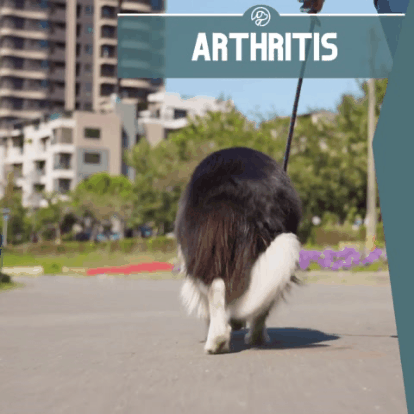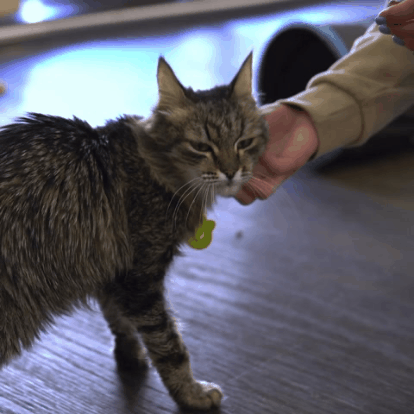
What is arthritis?
Arthritis is the number one cause of chronic pain in dogs and cats and is a result of long-term stresses on a joint where normal cartilage gets replaced with bone. When bone replaces cartilage, it causes the joint to become very stiff and painful as the joint loses its cushion. As the condition worsens, the bones within the joint come into contact with each other resulting in bone erosion and damage.
Most of the affected joints in our pets are the hips, elbows, knees, wrists and lower back.
Does cold weather exacerbate arthritis?
Yes! Winter can be an uncomfortable time for pets with arthritis as the cooler weather can worsen sore joints, making them more stiff, painful and reducing their range of motion. This occurs as the low temperatures are known to heighten pain sensitivity, slow blood circulation and cause muscle spasms.
Arthritis in Dogs:
Arthritis in dogs is more common than you think, and not just a disease of older dogs. It has been found that 20% of dogs greater than 1 year old and 90% of dogs > 5 years old have arthritic changes. It can affect dogs at any age, gender or breed however large breed dogs and overweight dogs are more likely to have arthritis due to the higher forces being placed on the cartilage and accelerating its degeneration.
Arthritis often starts with mild discomfort, but overtime can become increasingly painful. Does your dog show any of the following signs?
- Limping after exercise?
- Lagging behind after walks?
- Slow to rise?
- Difficulty jumping?
- Feeling stiff?
- Difficulty going up or down stairs?
- Less active or hesitant to weight bear on any limbs?
- Having unusual urination?
Check your dog for signs of arthritis using this quiz:
How can you manage arthritis in your dog?
The goal for treating arthritis in your dog is through alleviating pain, maintaining mobility and improving their quality of life. There are many options that we can provide to help your dog tackle arthritis.
– Beransa
A newly formulated monthly injectable monoclonal antibody which blocks pain signalling pathways providing effective pain relief in patients with arthritis, improving their mobility, comfort and wellbeing. Beransa is well tolerated in healthy dogs and has little known side effects so is a very safe option for long term arthritis management. Studies have found that 1 in 6 dogs will show improvement after 1 week and 1 in 2 dogs will see improvement in arthritis pain after 1 month.
– CBD Oil:
Veterinary formulated CBD products have significant potential for arthritis and chronic pain management through reducing inflammation and neuropathic pain. These products can come in flavoured chews, making administration to your pet easy. Current studies have found minimal side effects associated with CBD oil however, baseline blood tests are recommended prior to use.
– Non-steroidal anti-inflammatories (NSAIDs)
Work by reducing the inflammation around the joints which provides pain relief for your pet. It is important to have regular check-ups with your veterinarian as this type of drug can have side effects and may not be suitable for all patients.
– Dietary supplements:
Food products such as Royal Canin Mobility diet, Hills J/D or supplements that contain ingredients such as glucosamine, chondroitin and/or Omega fatty acids that contain EPA and DHA may help to keep the joints healthy.
– Pentosan – Zydax
These are series of injections (1 injection weekly for 4 weeks) which help to slow down the progression of arthritis through cartilage repair, improved joint lubrication and joint stability. These injections can be repeated every 6-12 months and have minimal known side effects.
– Avoid winter weight gain
The more weight your pet carries, the heavier the load they have on their joints which will make their arthritis worse. Fat tissue is also metabolically active and inflammatory so may contribute to further development of degenerative joint disease.
– Keep your pet warm
Ensure your fur baby has access to warm bedding and is away from cold draughts during the winter period. If significant arthritis is present, then assisting mobility through ramps, non-slip flooring, regular nail trims and having raised feed + water bowls is recommended to assist with comfort.

Arthritis in Cats:
Cats are very good at hiding illness and pain so you may not notice any arthritic changes in your fellow feline. 90% of cats over the age of 12 are likely to have arthritis. It can affect cats at any age, gender or breed however breeds such as Scottish folds, Burmese, Maine Coons and Abyssinians and overweight cats are more likely to have arthritis.
Does your cat show any of the following signs?
- Using a bunny hop or stopping when climbing up stairs?
- Angling the body to one side of stopping for a break when going down stairs?
- Slowing down when chasing their toys?
- Hesitating to jump onto surfaces?
- Hesitating to jump down?
- Show reduced energy or enthusiasm?
- Slowing down when running or walking?
- Have a stiff gait?
- Sleeping more or have changes in grooming behaviour?
- Having toileting accidents out of the litter tray?
Check your cat for signs of arthritis using this quiz:
How can you manage arthritis in your cat?
The goal for treating arthritis in your cat is through alleviating pain, maintaining mobility and improving their quality of life. There are many options that we can provide to help your cat tackle arthritis.
Solensia
A newly formulated monthly injectable monoclonal antibody which blocks pain signalling pathways providing effective pain relief in patients with arthritis, improving their mobility, comfort and wellbeing. Solensia is well tolerated in healthy cats, has little known side effects and minimal involvement of the liver and kidney so is a very safe option for long term arthritis management. 77% of cat owners reported significant improvement in signs of pain when their cats were treated with Solensia.
Non-steroidal anti-inflammatories (NSAIDs)
Work by reducing the inflammation around the joints which provides pain relief for your pet. It is important to have regular check-ups with your veterinarian as this type of drug can have side effects and may not be suitable for all patients.
Dietary supplements:
Food products such as Royal Canin Mobility diet, Hills J/D or supplements that contain ingredients such as glucosamine, chondroitin, Omega fatty acids that contain EPA and DHA may help to keep the joints healthy.
Pentosan – Zydax
These are series of injections (1 injection weekly for 4 weeks) which helps to slow down the progression of arthritis through cartilage repair, improved joint lubrication and joint stability. These injections can be repeated every 6-12 months and have minimal side effects.
Avoid winter weight gain
The more weight your pet carries, the heavier the load they have on their joints which will make their arthritis worse. Fat tissue is also metabolically active and inflammatory so may contribute to further development of degenerative joint disease.
Keep your pet warm
Ensure your fur baby has access to warm bedding and is away from cold draughts during the winter period. If significant arthritis is present, then assisting mobility through having steps or ramps and low sided kitty litter trays is recommended to assist with home comfort.
Click below to book in and discuss your pet’s arthritis plan.
– Written by Brianne Pepper – BAVBsc (Hons). Contact us for more resources and references.